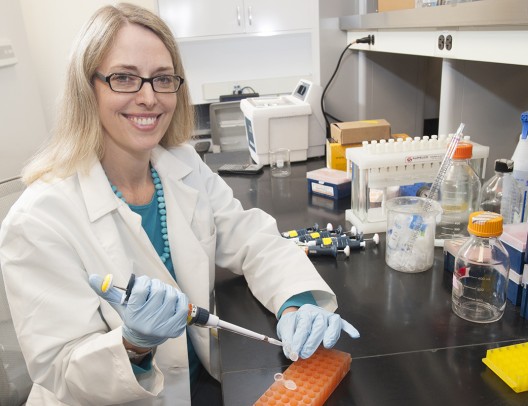Test makes medication safer for African Americans

Lisa Cavallari: “Genotyping personalizes the warfarin dosage for each patient.” Photo: Roberta Dupuis-Devlin/UIC Photo Services (Click on image for larger file size)
With a new genetic test, more than 150 African American patients at UI Health received customized dosages of a blood-thinning medication that make the drug safer.
UI Health is among the first centers in the U.S. to use genetic information to precisely tailor a patient’s dose of warfarin, a highly effective blood thinner for people at risk for blood clots and stroke.
“Genotyping personalizes the warfarin dosage for each patient,” said Lisa Cavallari, associate professor of pharmacy practice.
“This is helping to prevent both overdoses and underdoses of the drug, and may significantly lower serious adverse events such as hemorrhage, thrombosis and even death.”
UI Health’s Warfarin Pharmacogenetics Service is part of the International Warfarin Pharmacogenetics Consortium, which recently reported that a newly discovered genetic variant affects the safe dosage of the blood thinner for about 40 percent of African American patients taking it. The findings were published in The Lancet.
Cavallari and Edith Nutescu, clinical professor of pharmacy practice, are two of the 42 researchers from 17 institutions involved in the study, led by University of Florida Health researcher Julie Johnson, director of the UF Center for Pharmacogenomics.

Edith Nutescu and Cavallari are among researchers at 17 institutions working on the nationwide study. (Click on image for larger file size)
With more than 33 million prescriptions in 2012, warfarin is the most widely prescribed oral anticoagulant in the U.S. It is also one of the most dangerous drugs, accounting for a third of hospitalizations related to adverse drug events in patients older than 65.
Proper dosing is difficult but critical for safe and effective treatment.
Warfarin daily doses range from 1 to 20 milligrams, and even the smallest miscalculation can lead to clotting or bleeding complications, Cavallari said.
The genetic test used at UI Health identifies common variants in a clotting enzyme that is the target of warfarin, and in another enzyme that breaks down warfarin in the body, Cavallari said. The newly discovered variant also affects the breakdown of warfarin.
“Without the use of genetics — along with other factors, including a patient’s weight, age and other drugs being taken — the proper dose may take a few weeks or even months to determine,” she said. “We hope to add this new variant to our testing panel for all patients.”
As part of the Warfarin Pharmacogenetics Service, when warfarin is first prescribed to a patient at UI Health, a computer orders a genetic test, along with pharmacy and medical consultations. A blood sample is sent to the laboratory, where the DNA is isolated and processed on an FDA-cleared genotyping platform.
Results for the clotting enzyme and eight variations of the other enzyme’s genes are usually available within six hours, Cavallari said.
Patients are also asked for their consent to use their leftover DNA samples for research, Cavallari said.
“We hope to find additional variants that are important for warfarin dosing in both African American and Hispanic populations,” she said.
